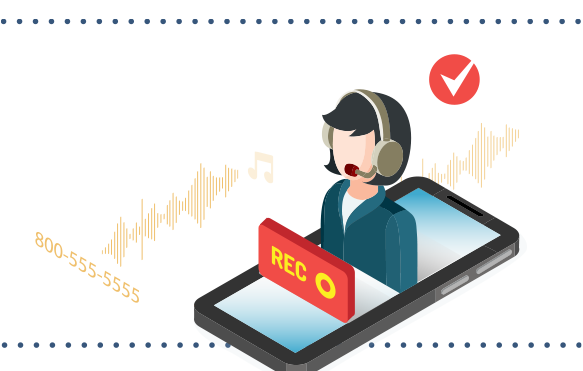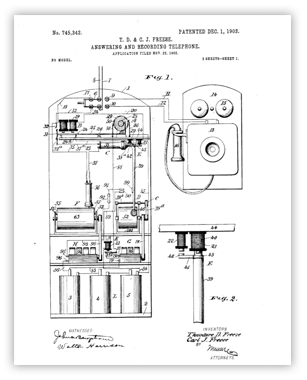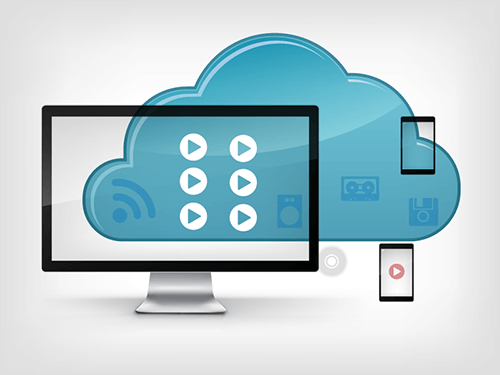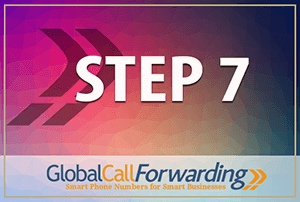Call Recording: A Business Communication Tool
Oftentimes, companies may run into trouble for not keeping proper records of their customers or for not remembering a conversation accurately. And, it is not always feasible to make notes while on a call. This is where call recording comes in handy. When calling certain companies, you may have heard the phrase: “This call is being recorded for quality assurance purposes.” This is because the business has decided to record their calls for future reference.
This feature or service gives users the ability to record incoming and outgoing calls. You can record calls manually or automatically using call recording apps, software, or recording gadgets. However, call recording software is most preferred by large corporations due to the added benefits that come with automatic recording capabilities. Call recording:
- Provides client records
- Enhances customer service
- Improves employee productivity
- Enables companies to maintain full compliance through recorded transactions
- Acts as evidence to protect from liabilities, and more.
There are many reasons to opt for this business communication feature; let’s have a look at a few.

Keep Track of Callers
Call recording can help keep track of incoming and outgoing calls and the purpose of each call. Call centers or businesses with high call volumes may experience overwhelming call activity. So, it is useful to record calls as one can refer to details or information stored within the recording. And, most call recording software allows recorded calls to be saved as audio files either on the user’s device, email, or the software itself. This makes past conversations easy to access.
Execute Call Quality Assurance
Consider this example: You are the manager of a call center and you notice a dip in the number of sales being closed. You train your employees again, but still, there seems to be no improvement. How do you begin to identify what or where the problem is?
Here, having the ability to go back in time and review a bad call can provide insights into issues faced. Essentially, businesses may choose to record customer calls to analyze the quality of the call. This, in fact, is the most common use of this feature. You can study the way your agents are interacting with the person on the other end of the call. And then determine what to change and or what strategies are working. For example, are customers responding well to the script being used? Or, is your agent’s talking speed impeding the sale? Or, is the agent too slow when pitching the product? Was your rep able to clearly explain the product and answer questions?
Review recordings to train new and old employees to do a good job. In the midst of hundreds of calls, it is easy to lose track of the small details. Recordings can bring those details to light and make reps aware of their errors. On the other hand, you can also highlight successful calls and strategies you want agents to repeat. Encouraging and acknowledging strengths can motivate employees to put in every effort needed.
Conduct Market Research
 Call recording can also become a part of your marketing efforts. For instance, imagine you just started a new company, developed your product, and hired necessary personnel. Now, you wait for the sales to come gushing in. But they’re too slow for your taste. How can you improve? Are you putting your efforts in the right place? Do you need to rethink your marketing strategy?
Call recording can also become a part of your marketing efforts. For instance, imagine you just started a new company, developed your product, and hired necessary personnel. Now, you wait for the sales to come gushing in. But they’re too slow for your taste. How can you improve? Are you putting your efforts in the right place? Do you need to rethink your marketing strategy?
Listen to recorded calls to get an idea of what callers’ preferences and habits are. How are they responding to your product or to specific questions? Where are your callers calling from, and is it the place you intend to target? How did prospects come across your service and what prompted them to call or do business with you? Or, why are they choosing certain products over others? These questions will lead you to understand whether you are marketing your product in the right place or whether it is targeting the right audience, and so on. You can also learn what makes clients say, “No, I don’t need this right now” or what times of day they prefer talking. Or, you can identify the main issues customers face while using your product.
Basically, you can establish the strength of what you sell by paying attention to how customers are reacting to it. And that information is priceless because it can tell you what is successful and what needs to be changed.
Avoid Liabilities
It is common for companies to face lawsuits for a variety of reasons. Miscommunications, inappropriate behavior, and scamming can become a huge problem for a business. Such disputes can stem out of misunderstandings or someone trying to make easy money and can lead to expensive lawsuits. And at times, determining who is at fault can be difficult. In such cases, having evidence of a transaction or correspondence is useful. Call recording software can serve this purpose by reducing the company’s liabilities and protecting it from costly lawsuits by functioning as a valuable asset.
How to Record Your Phone Calls
There are a few different ways to record a phone conversation for business purposes. And these methods depend on the type of office phone system your company runs on. Consider this: do you have a high outgoing call volume and therefore need to record outbound calls? And so, will a mobile call recording app work or do you need a more sophisticated recording software? Or, can you benefit from an automatic recorder that records all calls? Global Call Forwarding’s “Call Recording” feature, for example, records 100% of calls and this percent can be adjusted.
![]()
Based on your needs, you can choose to get a mobile/desktop app, recording device, or purchase the feature from your phone service provider. Keep in mind, phone apps don’t always have high-quality recordings. And recording devices can be too cumbersome to use, interrupting the call. Call recording software, therefore, is your best bet.
And an effective way to get a call recording software is to purchase it with your virtual business number. Virtual numbers route calls over the internet instead of traditional phone lines. And this makes it easy to attach other communication tools to your phone line for a reasonable price. For example, you can direct incoming international calls to your personal number without paying high international charges. But more importantly, you can add call recording as a feature to your phone service plan. Then, you can access all your calls, call activity, recordings, and more in one place.
Call Recording Laws
While call recording is an important business communication resource, it is highly essential to note that there are federal and state laws regulating this service. The Federal Communications Commission (FCC) for the United States and General Data Protection Regulation (GDPR) for the European Union are the two main regulating bodies. Make sure you are aware of your country, state, and city’s call recording rules so that you don’t run into any trouble.
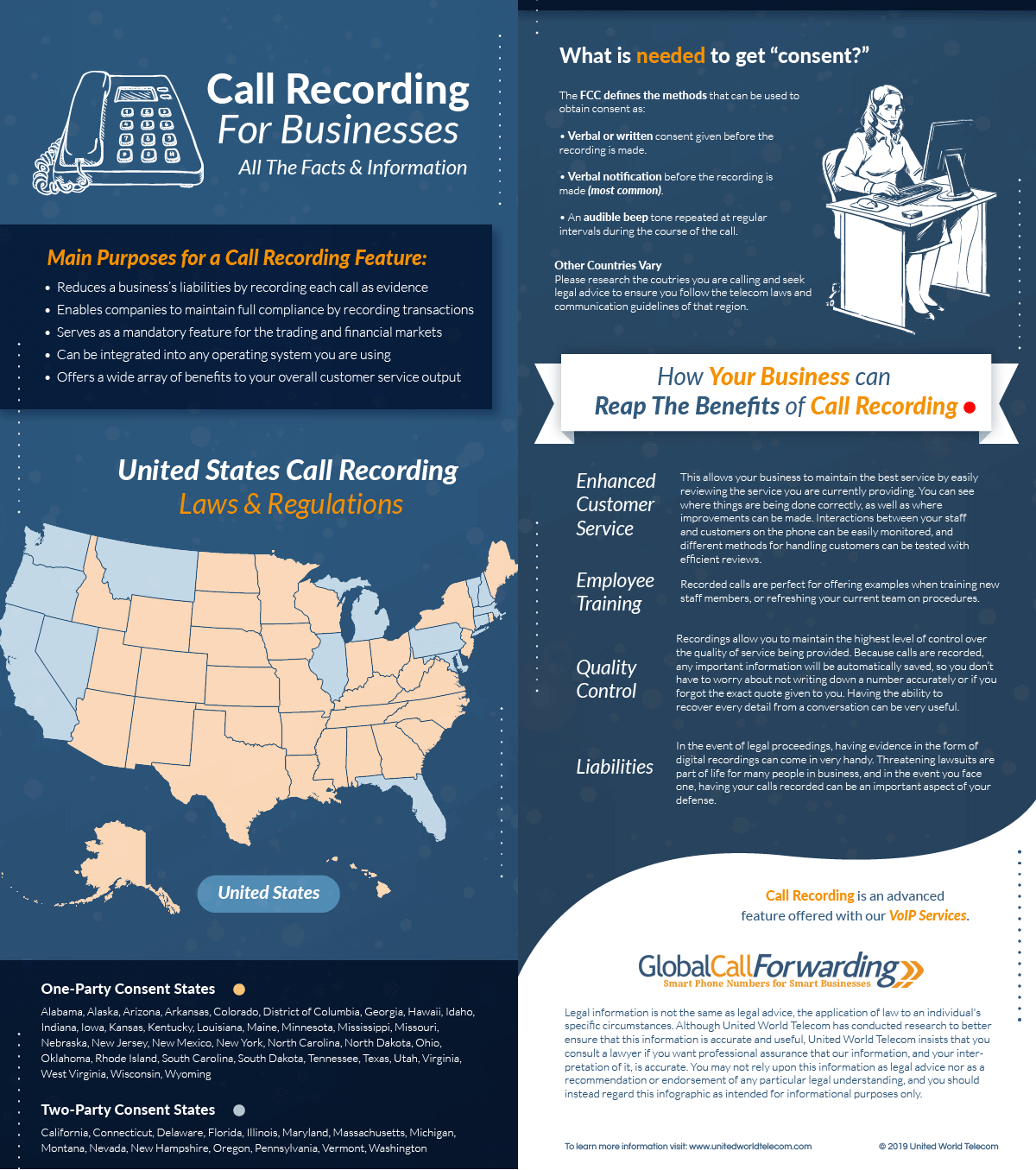
Try Recording Calls for Easy Business Correspondence
Recording calls has become increasingly popular for businesses due to the positive benefits that come with the feature. Start now and enhance your customer interaction with this service. Contact us to see how we can help with your business communication needs and begin recording important calls today!
